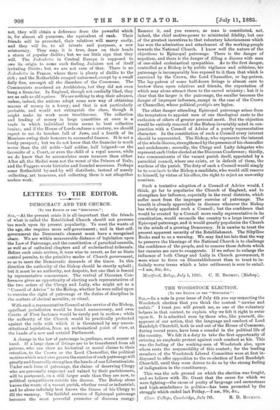LETTERS TO THE EDITOR.
DEMOCRACY AND THE CHURCH.
[To THE EDITOR OF THE "SPECTATOR." J SIII,—At the present crisis it is all-important that the friends of what is called the Established Church should not presume too much upon its present popularity. To meet the wants of the age, she requires more self-government ; and in that self- government the Democratic element must have a recognised share. We are within measureable distance of legislation upon the Law of Patronage, and the constitution of parochial councils, -as well as of cathedral chapters and of ecclesiastical tribunals. Before such crisis arrives, it were wise to revert, as far as State control permits, to the primitive modes of Church government, so as to meet the Democratic demands of the times. In this direction the authority of the Bishop should be stoutly upheld ; but it must be an authority, not despotic, but one that is fenced by representative concurrence. The revival of Diocesan Con- ferences gives an opportunity of electing such representatives of the two orders of the Clergy and Laity, who might act as a "Council of Advice" to the Bishop, whether he were called upon to exercise the right of patronage or the duties of discipline in the matters of clerical morality, or ritual.
With such a representative Council at the service of the Bishop, appellant jurisdiction would be found unnecessary, and even Courts of First Instance would be rarely put in motion ; while the authority of the Church would be practically protected against the evils with which it is threatened by any uncon- stitutional legislation, from an ecclesiastical point of view, at the hands of a new and untried Parliament.
A change in the law of patronage is, perhaps, much nearer at hand. If a large class of livings are to be transferred from all patrons, who can show no historical or moral claims to their retention, to the Crown or the Lord Chancellor, the political motives which must ever govern the exercise of such patronage will greatly and deservedly strengthen the hands of our Liberationists. Under such form of patronage, the claims of deserving Clergy who are personally respected and valued by their parishioners, will be postponed, on a still larger scale than they are now, to political sympathisers outside the diocese. The Bishop alone knows the wants of a vacant parish, whether rural or industrial; and he alone infinitely best knows the fitness of his Clergy to fill the vacancy. The faithful exercise of Episcopal patronage becomes the most powerful promoter of diocesan energy. Remove it, and you remove, as man is constituted, not, indeed, the chief motive-power to ministerial fidelity, but one of the greatest incentives to that voluntary laboriousness which has won the admiration and attachment of the working-people towards the National Church. I know well the nature of the objections to Episcopal patronage. There is the danger of nepotism, and there is the danger of filling a diocese with men of one-sided ecclesiastical sympathies. As to the first danger, controlled as a Bishop is by public vigilance and criticism, his patronage is incomparably less exposed to it than that which is exercised by the Crown, the Lord Chancellor, or lay-patron. The lay-patron of some half-dozen livings is almost sure to bestow them upon relatives and friends, the expectation of which may alone attract them to the sacred ministry; but it is clear that the larger is the patronage, the smaller becomes the danger of improper influence,.except in the case of the Crown or Chancellor, whose political proteges are legion.
The other danger attending Episcopal patronage arises from the temptation to appoint men of one theological caste to the exclusion of others of greater personal merit. But the objection would be entirely removed if the Bishop invariably acted in con- junction with a Council of Advice of a purely representative character. In the constitution of such a Council every interest should be represented. The Bishop, who represents the interest of the whole diocese, strengthened by the presence of his chancellor and archdeacon; secondly, the Clergy and Laity delegates who represent each Order elected at the Diocesan Conference; thirdly, two communicants of the vacant parish itself, appointed by a parochial council, where one exists, or in default of them, the wardens of the parish. The duty of such a Council would simply be to nominate to the Bishop a candidate, who would still reserve to himself, by virtue of his office, the right to reject an unworthy nominee.
Such a tentative adoption of a Council of Advice would, I think, go far to popularise the Church of England, and to strengthen her influence, especially in the rural districts, which suffer most from the improper exercise of patronage. The benefit is already appreciable in dioceses wherever the Bishop has wisely appointed such a Council ; but the confidence that would be created by a Council more really representative in its constitution, would reconcile the country to a large increase of Episcopal patronage, and it would greatly popularise the Church in the minds of a growing Democracy. It is unwise to trust the present apparent security of the Establishment. The Sibylline Books read to us a warning. We may find too late that the way to preserve the blessings of the National Church is to challenge the confidence of the people, and to remove those defects which her enemies are sure to exaggerate. If we refuse to enlarge the influence of both Clergy and Laity in Church government, it were wiser to force on Disestablishmeut than to trust to in- finitely worse terms which a later settlement is sure to entail. —I am, Sir, &c.,
Montford, Salop, July 1, 1885. C. H. BROMBY, [Bishop].


































 Previous page
Previous page